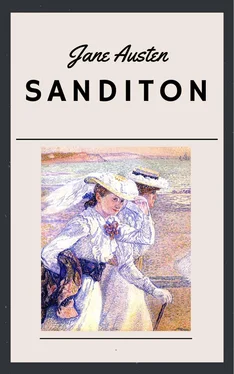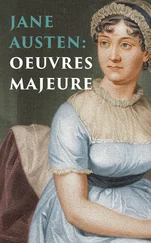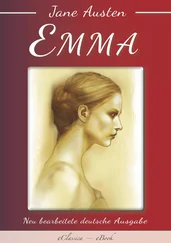Jane Austen - Jane Austen - Sanditon
Здесь есть возможность читать онлайн «Jane Austen - Jane Austen - Sanditon» — ознакомительный отрывок электронной книги совершенно бесплатно, а после прочтения отрывка купить полную версию. В некоторых случаях можно слушать аудио, скачать через торрент в формате fb2 и присутствует краткое содержание. Жанр: unrecognised, на английском языке. Описание произведения, (предисловие) а так же отзывы посетителей доступны на портале библиотеки ЛибКат.
- Название:Jane Austen - Sanditon
- Автор:
- Жанр:
- Год:неизвестен
- ISBN:нет данных
- Рейтинг книги:4 / 5. Голосов: 1
-
Избранное:Добавить в избранное
- Отзывы:
-
Ваша оценка:
- 80
- 1
- 2
- 3
- 4
- 5
Jane Austen - Sanditon: краткое содержание, описание и аннотация
Предлагаем к чтению аннотацию, описание, краткое содержание или предисловие (зависит от того, что написал сам автор книги «Jane Austen - Sanditon»). Если вы не нашли необходимую информацию о книге — напишите в комментариях, мы постараемся отыскать её.
Sandition, although it remained unfinished, is truly Jane Austen at her funniest. A comedy, it continues the strain of burlesque and caricature she wrote as a teenager and in private throughout her life.
Jane Austen - Sanditon — читать онлайн ознакомительный отрывок
Ниже представлен текст книги, разбитый по страницам. Система сохранения места последней прочитанной страницы, позволяет с удобством читать онлайн бесплатно книгу «Jane Austen - Sanditon», без необходимости каждый раз заново искать на чём Вы остановились. Поставьте закладку, и сможете в любой момент перейти на страницу, на которой закончили чтение.
Интервал:
Закладка:
Table of Contents
Title Page Sanditon by Jane Austen Jane Austen’s last novel Unfinished
Chapter 1
Chapter 2
Chapter 3
Chapter 4
Chapter 5
Chapter 6
Chapter 7
Chapter 8
Chapter 9
Chapter 10
Chapter 11
Chapter 12
Sanditon
by
Jane Austen
Jane Austen’s last novel
Unfinished
Chapter 1
A gentleman and a lady travelling from Tunbridge towards that part of the Sussex coast which lies between Hastings and Eastbourne, being induced by business to quit the high road and attempt a very rough lane, were overturned in toiling up its long ascent, half rock, half sand. The accident happened just beyond the only gentleman’s house near the lane—a house which their driver, on being first required to take that direction, had conceived to be necessarily their object and had with most unwilling looks been constrained to pass by. He had grumbled and shaken his shoulders and pitied and cut his horses so sharply that he might have been open to the suspicion of overturning them on purpose (especially as the carriage was not his master’s own) if the road had not indisputably become worse than before, as soon as the premises of the said house were left behind—expressing with a most portentous countenance that, beyond it, no wheels but cart wheels could safely proceed. The severity of the fall was broken by their slow pace and the narrowness of the lane; and the gentleman having scrambled out and helped out his companion, they neither of them at first felt more than shaken and bruised. But the gentleman had, in the course of the extrication, sprained his foot—and soon becoming sensible of it, was obliged in a few moments to cut short both his remonstrances to the driver and his congratulations to his wife and himself—and sit down on the bank, unable to stand.
“There is something wrong here,” said he, putting his hand to his ankle. “But never mind, my dear—” looking up at her with a smile, “it could not have happened, you know, in a better place—Good out of evil. The very thing perhaps to be wished for. We shall soon get relief. There, I fancy, lies my cure—” pointing to the neat-looking end of a cottage, which was seen romantically situated among wood on a high eminence at some little distance—”Does not that promise to be the very place?”
His wife fervently hoped it was; but stood, terrified and anxious, neither able to do or suggest anything, and receiving her first real comfort from the sight of several persons now coming to their assistance. The accident had been discerned from a hayfield adjoining the house they had passed. And the persons who approached were a well-looking, hale, gentlemanlike man, of middle age, the proprietor of the place, who happened to be among his haymakers at the time, and three or four of the ablest of them summoned to attend their master—to say nothing of all the rest of the field—men, women and children, not very far off.
Mr. Heywood, such was the name of the said proprietor, advanced with a very civil salutation, much concern for the accident, some surprise at anybody’s attempting that road in a carriage, and ready offers of assistance. His courtesies were received with good breeding and gratitude, and while one or two of the men lent their help to the driver in getting the carriage upright again, the traveller said, “You are extremely obliging, sir, and I take you at your word. The injury to my leg is, I dare say, very trifling. But it is always best in these cases, you know, to have a surgeon’s opinion without loss of time; and as the road does not seem in a favourable state for my getting up to his house myself, I will thank you to send off one of these good people for the surgeon.”
“The surgeon, sir!” exclaimed Mr. Heywood. “I am afraid you will find no surgeon at hand here, but I dare say we shall do very well without him.”
“Nay sir, if he is not in the way, his partner will do just as well, or rather better. I would rather see his partner. Indeed I would prefer the attendance of his partner. One of these good people can be with him in three minutes, I am sure. I need not ask whether I see the house,” (looking towards the cottage) “for excepting your own, we have passed none in this place which can be the abode of a gentleman.”
Mr. Heywood looked very much astonished, and replied: “What, sir! Are you expecting to find a surgeon in that cottage? We have neither surgeon nor partner in the parish, I assure you.”
“Excuse me, sir,” replied the other. “I am sorry to have the appearance of contradicting you, but from the extent of the parish or some other cause you may not be aware of the fact. Stay. Can I be mistaken in the place? Am I not in Willingden? Is not this Willingden?”
“Yes, sir, this is certainly Willingden.”
“Then, sir, I can bring proof of your having a surgeon in the parish, whether you may know it or not. Here, sir,” (taking out his pocket book) “if you will do me the favor of casting your eye over these advertisements which I cut out myself from the Morning Post and the Kentish Gazette, only yesterday morning in London, I think you will be convinced that I am not speaking at random. You will find in it an advertisement of the dissolution of a partnership in the medical line in your own parish—extensive business, undeniable character respectable references wishing to form a separate establishment. You will find it at full length, sir,”—offering the two little oblong extracts.
“Sir,” said Mr. Heywood with a good humoured smile, “if you were to show me all the newspapers that are printed in one week throughout the kingdom, you would not persuade me of there being a surgeon in Willingden,” said Mr. Heywood with a good-humoured smile. “Having lived here ever since I was born, man and boy fifty-seven years, I think I must have known of such a person. At least I may venture to say that he has not much business. To be sure, if gentlemen were to be often attempting this lane in post-chaises, it might not be a bad speculation for a surgeon to get a house at the top of the hill. But as to that cottage, I can assure you, sir, that it is in fact, in spite of its spruce air at this distance, as indifferent a double tenement as any in the parish, and that my shepherd lives at one end and three old women at the other.”
He took the pieces of paper as he spoke, and, having looked them over, added, “I believe I can explain it, sir. Your mistake is in the place. There are two Willingdens in this country. And your advertisement refers to the other, which is Great Willingden or Willingden Abbots, and lies seven miles off on the other side of Battle—quite down in the Weald. And we, sir,” he added, speaking rather proudly, “are not in the Weald.”
“Not down in the weald, I am sure,” replied the traveller pleasantly. “It took us half an hour to climb your hill. Well, I dare say it is as you say and I have made an abominably stupid blunder—all done in a moment. The advertisements did not catch my eye till the last half hour of our being in town—when everything was in the hurry and confusion which always attend a short stay there. One is never able to complete anything in the way of business, you know, till the carriage is at the door. And, accordingly satisfying myself with a brief inquiry, and finding we were actually to pass within a mile or two of a Willingden, I sought no farther...My dear,” (to his wife) “I am very sorry to have brought you into this scrape. But do not be alarmed about my leg. It gives me no pain while I am quiet. And as soon as these good people have succeeded in setting the carriage to rights and turning the horses round, the best thing we can do will be to measure back our steps into the turnpike road and proceed to Hailsham, and so home, without attempting anything farther. Two hours take us home from Hailsham. And once at home, we have our remedy at hand, you know. A little of our own bracing sea air will soon set me on my feet again. Depend upon it, my dear, it is exactly a case for the sea. Saline air and immersion will be the very thing. My sensations tell me so already.”
Читать дальшеИнтервал:
Закладка:
Похожие книги на «Jane Austen - Sanditon»
Представляем Вашему вниманию похожие книги на «Jane Austen - Sanditon» списком для выбора. Мы отобрали схожую по названию и смыслу литературу в надежде предоставить читателям больше вариантов отыскать новые, интересные, ещё непрочитанные произведения.
Обсуждение, отзывы о книге «Jane Austen - Sanditon» и просто собственные мнения читателей. Оставьте ваши комментарии, напишите, что Вы думаете о произведении, его смысле или главных героях. Укажите что конкретно понравилось, а что нет, и почему Вы так считаете.












